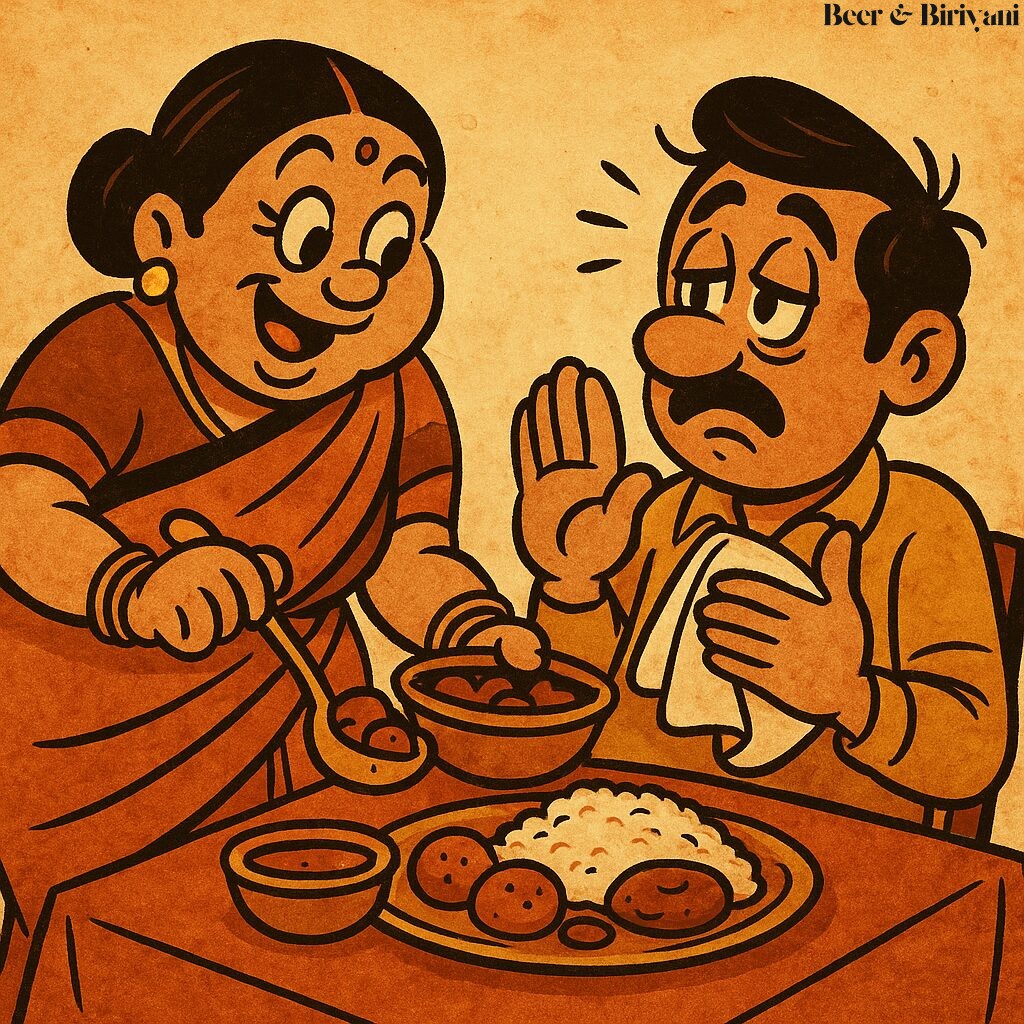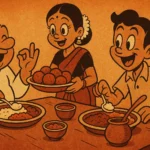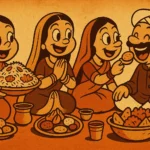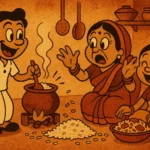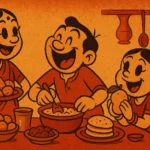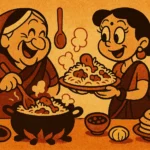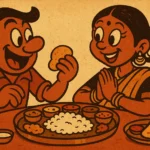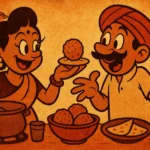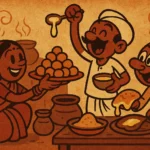It starts with a full plate. Not metaphorically. Literally. A plate already brimming with rice, dal, sabzi, and at least one papad threatening to slide off. You’ve taken three rounds. You’re full. Your digestive system is waving a white flag. And then—without warning—a relative approaches, ladle in hand, eyes full of love and menace, and says: “Thoda aur le lo.”
In most Indian families, saying “no” to more food isn’t about hunger. It’s about bravery. And skill. It’s a test of emotional agility—dodging both the second helping and the potential heartbreak of your host. Because feeding, in our culture, is not just nourishment. It’s affection. Validation. A silent performance of care, guilt, and pride simmered together like a good sambar.
The Serving Spoon of Doom
Every household has That One Aunty. Her sari is flawless, her cooking flawless-er, and her grip on the ladle—unyielding. She will not rest until your plate resembles a small hillock. “Beta, eat!” she says, as if your life depends on it. Your refusal is met with disbelief. “You don’t like my cooking?” she whispers, scandalized. You panic and eat. She smiles. You die (internally).
This isn’t new. Across India, across generations, food has been both offering and obligation. The more love you show, the more ghee you pour. The more pride you feel, the more mithai you serve. A refusal, even when gentle, is often received like a betrayal. “She said no to my halwa,” an aunt once muttered under her breath at a family gathering, like I had insulted her lineage.
Why It’s So Hard to Say No
Part of it is history. For centuries, food was a sign of abundance. You fed guests to show you had plenty. You never let someone leave without eating—a principle older than most recipes. Hospitality was sacred. Which makes the act of refusal feel like you’re rejecting not just food, but love itself. It’s not “I’m full.” It’s heard as “You didn’t cook well enough.”
And then there’s the ritual of repetition. Indian hosts don’t ask once. They ask three times. Minimum. The first is a test. The second is polite insistence. The third? A full-scale emotional ambush. You must survive all three to officially “not want more.”
Advanced Techniques of Refusal
Over the years, I’ve developed a few strategies. Some have worked. Some have failed spectacularly.
1. The Fake Full Plate: Keep a little bit of everything visible. Hosts rarely serve when your plate looks occupied. Spread out the rice. Fluff the sabzi. Look busy.
2. The Compliment & Deflect: “It’s so delicious, I want to savor it slowly.” Sounds like a compliment. Works like a charm. Sometimes.
3. The Slow Eater Method: Time your chewing. Linger over that last spoon of dal. Pretend you’re lost in deep thought. Bonus: no one asks a philosopher if they want more.
4. The Tiny Yes: Accept a symbolic spoonful. Just enough to show respect. Not enough to tip you into post-meal regret. Think of it as food diplomacy.
5. The Health Card: “Doctor said no third helpings.” Even if the doctor is imaginary, this one often shuts things down. Unless your aunt is a doctor. Then you’re doomed.
And Yet… We Always Say Yes
Despite all these tricks, I often give in. I say yes when I mean no. I smile and let that extra spoon of kheer land on my plate because I know it carries something heavier than rice: affection, nostalgia, an entire generation’s understanding of love through ladles.
And sometimes, honestly, I want to say yes. Because that extra puri tastes better when it’s offered by a hand that remembers how you liked it as a child. Because eating more than you should, surrounded by people who love you, is a very specific kind of joy. A post-meal nap might be ruined. But your heart? That’s full.
Learning to Say No (Softly)
Nowadays, I try a new strategy—gratitude. “Thank you. This was amazing. I’ll come back for more later.” It’s a promise and an escape route. Sometimes it works. Sometimes I find myself with three extra gulab jamuns anyway. But at least now, I see it differently. Saying no isn’t just resistance—it’s part of the larger dance. One we’ve all been choreographed into.
So the next time someone approaches with the sixth ladle of dal, and you’ve already eaten your body weight in rice—pause. Smile. Choose your words carefully. And remember: you’re not just refusing food. You’re navigating culture, memory, and affection served warm, with ghee on top.
Born in Mumbai, now stir-frying feelings in Texas. Writes about food, memory, and the messy magic in between — mostly to stay hungry, sometimes just to stay sane.

